[English] 日本語
 Yorodumi
Yorodumi- EMDB-30623: Cryo-EM structure of the human MCT1 D309N mutant in complex with ... -
+ Open data
Open data
- Basic information
Basic information
| Entry | Database: EMDB / ID: EMD-30623 | |||||||||
|---|---|---|---|---|---|---|---|---|---|---|
| Title | Cryo-EM structure of the human MCT1 D309N mutant in complex with Basigin-2 in the inward-open conformation. | |||||||||
 Map data Map data | ||||||||||
 Sample Sample |
| |||||||||
 Keywords Keywords | Proton-coupled monocarboxylate transporter / MCT1 / Basigin / AZD3965 / single particle cryo-EM / latate transporter / TRANSPORT PROTEIN | |||||||||
| Function / homology |  Function and homology information Function and homology informationmevalonate transmembrane transporter activity / mevalonate transport / behavioral response to nutrient / plasma membrane lactate transport / pyruvate transmembrane transport / lactate transmembrane transporter activity / lactate:proton symporter activity / Defective SLC16A1 causes symptomatic deficiency in lactate transport (SDLT) / succinate transmembrane transport / Proton-coupled monocarboxylate transport ...mevalonate transmembrane transporter activity / mevalonate transport / behavioral response to nutrient / plasma membrane lactate transport / pyruvate transmembrane transport / lactate transmembrane transporter activity / lactate:proton symporter activity / Defective SLC16A1 causes symptomatic deficiency in lactate transport (SDLT) / succinate transmembrane transport / Proton-coupled monocarboxylate transport / monocarboxylic acid transmembrane transporter activity / monocarboxylic acid transport / positive regulation of matrix metallopeptidase secretion / succinate transmembrane transporter activity / carboxylic acid transmembrane transport / carboxylic acid transmembrane transporter activity / dendrite self-avoidance / acrosomal membrane / cell-cell adhesion mediator activity / pyruvate catabolic process / endothelial tube morphogenesis / response to mercury ion / neural retina development / photoreceptor cell maintenance / centrosome cycle / Basigin interactions / response to food / Aspirin ADME / odontogenesis of dentin-containing tooth / homophilic cell-cell adhesion / D-mannose binding / decidualization / positive regulation of vascular endothelial growth factor production / lateral plasma membrane / photoreceptor outer segment / response to cAMP / Integrin cell surface interactions / transport across blood-brain barrier / Degradation of the extracellular matrix / neutrophil chemotaxis / photoreceptor inner segment / positive regulation of endothelial cell migration / regulation of insulin secretion / embryo implantation / axon guidance / basal plasma membrane / protein localization to plasma membrane / sarcolemma / response to peptide hormone / positive regulation of interleukin-6 production / lipid metabolic process / cell junction / melanosome / glucose homeostasis / signaling receptor activity / virus receptor activity / angiogenesis / basolateral plasma membrane / positive regulation of viral entry into host cell / cell surface receptor signaling pathway / endosome / apical plasma membrane / cadherin binding / Golgi membrane / axon / focal adhesion / intracellular membrane-bounded organelle / synapse / centrosome / endoplasmic reticulum membrane / mitochondrion / extracellular exosome / identical protein binding / membrane / plasma membrane Similarity search - Function | |||||||||
| Biological species |  Homo sapiens (human) Homo sapiens (human) | |||||||||
| Method | single particle reconstruction / cryo EM / Resolution: 3.3 Å | |||||||||
 Authors Authors | Wang N / Jiang X | |||||||||
 Citation Citation |  Journal: Cell / Year: 2021 Journal: Cell / Year: 2021Title: Structural basis of human monocarboxylate transporter 1 inhibition by anti-cancer drug candidates. Authors: Nan Wang / Xin Jiang / Shuo Zhang / Angqi Zhu / Yafei Yuan / Hanwen Xu / Jianlin Lei / Chuangye Yan /   Abstract: Proton-coupled monocarboxylate transporters MCT1-4 catalyze the transmembrane movement of metabolically essential monocarboxylates and have been targeted for cancer treatment because of their ...Proton-coupled monocarboxylate transporters MCT1-4 catalyze the transmembrane movement of metabolically essential monocarboxylates and have been targeted for cancer treatment because of their enhanced expression in various tumors. Here, we report five cryo-EM structures, at resolutions of 3.0-3.3 Å, of human MCT1 bound to lactate or inhibitors in the presence of Basigin-2, a single transmembrane segment (TM)-containing chaperon. MCT1 exhibits similar outward-open conformations when complexed with lactate or the inhibitors BAY-8002 and AZD3965. In the presence of the inhibitor 7ACC2 or with the neutralization of the proton-coupling residue Asp309 by Asn, similar inward-open structures were captured. Complemented by structural-guided biochemical analyses, our studies reveal the substrate binding and transport mechanism of MCTs, elucidate the mode of action of three anti-cancer drug candidates, and identify the determinants for subtype-specific sensitivities to AZD3965 by MCT1 and MCT4. These findings lay out an important framework for structure-guided drug discovery targeting MCTs. | |||||||||
| History |
|
- Structure visualization
Structure visualization
| Movie |
 Movie viewer Movie viewer |
|---|---|
| Structure viewer | EM map:  SurfView SurfView Molmil Molmil Jmol/JSmol Jmol/JSmol |
| Supplemental images |
- Downloads & links
Downloads & links
-EMDB archive
| Map data |  emd_30623.map.gz emd_30623.map.gz | 59.8 MB |  EMDB map data format EMDB map data format | |
|---|---|---|---|---|
| Header (meta data) |  emd-30623-v30.xml emd-30623-v30.xml emd-30623.xml emd-30623.xml | 11.2 KB 11.2 KB | Display Display |  EMDB header EMDB header |
| Images |  emd_30623.png emd_30623.png | 157.8 KB | ||
| Filedesc metadata |  emd-30623.cif.gz emd-30623.cif.gz | 5.4 KB | ||
| Archive directory |  http://ftp.pdbj.org/pub/emdb/structures/EMD-30623 http://ftp.pdbj.org/pub/emdb/structures/EMD-30623 ftp://ftp.pdbj.org/pub/emdb/structures/EMD-30623 ftp://ftp.pdbj.org/pub/emdb/structures/EMD-30623 | HTTPS FTP |
-Validation report
| Summary document |  emd_30623_validation.pdf.gz emd_30623_validation.pdf.gz | 510.5 KB | Display |  EMDB validaton report EMDB validaton report |
|---|---|---|---|---|
| Full document |  emd_30623_full_validation.pdf.gz emd_30623_full_validation.pdf.gz | 510.1 KB | Display | |
| Data in XML |  emd_30623_validation.xml.gz emd_30623_validation.xml.gz | 6.1 KB | Display | |
| Data in CIF |  emd_30623_validation.cif.gz emd_30623_validation.cif.gz | 6.9 KB | Display | |
| Arichive directory |  https://ftp.pdbj.org/pub/emdb/validation_reports/EMD-30623 https://ftp.pdbj.org/pub/emdb/validation_reports/EMD-30623 ftp://ftp.pdbj.org/pub/emdb/validation_reports/EMD-30623 ftp://ftp.pdbj.org/pub/emdb/validation_reports/EMD-30623 | HTTPS FTP |
-Related structure data
| Related structure data |  7da5MC  6lyyC  6lz0C  7ckoC  7ckrC M: atomic model generated by this map C: citing same article ( |
|---|---|
| Similar structure data |
- Links
Links
| EMDB pages |  EMDB (EBI/PDBe) / EMDB (EBI/PDBe) /  EMDataResource EMDataResource |
|---|---|
| Related items in Molecule of the Month |
- Map
Map
| File |  Download / File: emd_30623.map.gz / Format: CCP4 / Size: 64 MB / Type: IMAGE STORED AS FLOATING POINT NUMBER (4 BYTES) Download / File: emd_30623.map.gz / Format: CCP4 / Size: 64 MB / Type: IMAGE STORED AS FLOATING POINT NUMBER (4 BYTES) | ||||||||||||||||||||||||||||||||||||||||||||||||||||||||||||
|---|---|---|---|---|---|---|---|---|---|---|---|---|---|---|---|---|---|---|---|---|---|---|---|---|---|---|---|---|---|---|---|---|---|---|---|---|---|---|---|---|---|---|---|---|---|---|---|---|---|---|---|---|---|---|---|---|---|---|---|---|---|
| Projections & slices | Image control
Images are generated by Spider. | ||||||||||||||||||||||||||||||||||||||||||||||||||||||||||||
| Voxel size | X=Y=Z: 0.8433 Å | ||||||||||||||||||||||||||||||||||||||||||||||||||||||||||||
| Density |
| ||||||||||||||||||||||||||||||||||||||||||||||||||||||||||||
| Symmetry | Space group: 1 | ||||||||||||||||||||||||||||||||||||||||||||||||||||||||||||
| Details | EMDB XML:
CCP4 map header:
| ||||||||||||||||||||||||||||||||||||||||||||||||||||||||||||
-Supplemental data
- Sample components
Sample components
-Entire : MCT1/Basigin-2 complex
| Entire | Name: MCT1/Basigin-2 complex |
|---|---|
| Components |
|
-Supramolecule #1: MCT1/Basigin-2 complex
| Supramolecule | Name: MCT1/Basigin-2 complex / type: complex / ID: 1 / Parent: 0 / Macromolecule list: all / Details: proton-coupling residue mutant D309N |
|---|---|
| Source (natural) | Organism:  Homo sapiens (human) Homo sapiens (human) |
-Macromolecule #1: Monocarboxylate transporter 1
| Macromolecule | Name: Monocarboxylate transporter 1 / type: protein_or_peptide / ID: 1 / Number of copies: 1 / Enantiomer: LEVO |
|---|---|
| Source (natural) | Organism:  Homo sapiens (human) Homo sapiens (human) |
| Molecular weight | Theoretical: 53.991867 KDa |
| Recombinant expression | Organism:  Homo sapiens (human) Homo sapiens (human) |
| Sequence | String: MPPAVGGPVG YTPPDGGWGW AVVIGAFISI GFSYAFPKSI TVFFKEIEGI FHATTSEVSW ISSIMLAVMY GGGPISSILV NKYGSRIVM IVGGCLSGCG LIAASFCNTV QQLYVCIGVI GGLGLAFNLN PALTMIGKYF YKRRPLANGL AMAGSPVFLC T LAPLNQVF ...String: MPPAVGGPVG YTPPDGGWGW AVVIGAFISI GFSYAFPKSI TVFFKEIEGI FHATTSEVSW ISSIMLAVMY GGGPISSILV NKYGSRIVM IVGGCLSGCG LIAASFCNTV QQLYVCIGVI GGLGLAFNLN PALTMIGKYF YKRRPLANGL AMAGSPVFLC T LAPLNQVF FGIFGWRGSF LILGGLLLNC CVAGALMRPI GPKPTKAGKD KSKASLEKAG KSGVKKDLHD ANTDLIGRHP KQ EKRSVFQ TINQFLDLTL FTHRGFLLYL SGNVIMFFGL FAPLVFLSSY GKSQHYSSEK SAFLLSILAF VNMVARPSMG LVA NTKPIR PRIQYFFAAS VVANGVCHML APLSTTYVGF CVYAGFFGFA FGWLSSVLFE TLMDLVGPQR FSSAVGLVTI VECC PVLLG PPLLGRLNDM YGDYKYTYWA CGVVLIISGI YLFIGMGINY RLLAKEQKAN EQKKESKEEE TSIDVAGKPN EVTKA AESP DQKDTDGGPK EEESPV UniProtKB: Monocarboxylate transporter 1 |
-Macromolecule #2: Basigin
| Macromolecule | Name: Basigin / type: protein_or_peptide / ID: 2 / Number of copies: 1 / Enantiomer: LEVO |
|---|---|
| Source (natural) | Organism:  Homo sapiens (human) Homo sapiens (human) |
| Molecular weight | Theoretical: 29.254938 KDa |
| Recombinant expression | Organism:  Homo sapiens (human) Homo sapiens (human) |
| Sequence | String: MAAALFVLLG FALLGTHGAS GAAGTVFTTV EDLGSKILLT CSLNDSATEV TGHRWLKGGV VLKEDALPGQ KTEFKVDSDD QWGEYSCVF LPEPMGTANI QLHGPPRVKA VKSSEHINEG ETAMLVCKSE SVPPVTDWAW YKITDSEDKA LMNGSESRFF V SSSQGRSE ...String: MAAALFVLLG FALLGTHGAS GAAGTVFTTV EDLGSKILLT CSLNDSATEV TGHRWLKGGV VLKEDALPGQ KTEFKVDSDD QWGEYSCVF LPEPMGTANI QLHGPPRVKA VKSSEHINEG ETAMLVCKSE SVPPVTDWAW YKITDSEDKA LMNGSESRFF V SSSQGRSE LHIENLNMEA DPGQYRCNGT SSKGSDQAII TLRVRSHLAA LWPFLGIVAE VLVLVTIIFI YEKRRKPEDV LD DDDAGSA PLKSSGQHQN DKGKNVRQRN SS UniProtKB: Basigin |
-Experimental details
-Structure determination
| Method | cryo EM |
|---|---|
 Processing Processing | single particle reconstruction |
| Aggregation state | particle |
- Sample preparation
Sample preparation
| Concentration | 5 mg/mL |
|---|---|
| Buffer | pH: 8 Details: 25 mM Tris pH 8.0, 150 mM NaCl, and 0.02% (w/v) GDN |
| Vitrification | Cryogen name: ETHANE |
- Electron microscopy
Electron microscopy
| Microscope | FEI TITAN KRIOS |
|---|---|
| Image recording | Film or detector model: GATAN K3 (6k x 4k) / Average electron dose: 37.6 e/Å2 |
| Electron beam | Acceleration voltage: 300 kV / Electron source:  FIELD EMISSION GUN FIELD EMISSION GUN |
| Electron optics | Illumination mode: FLOOD BEAM / Imaging mode: BRIGHT FIELD / Cs: 0.01 mm |
| Experimental equipment |  Model: Titan Krios / Image courtesy: FEI Company |
- Image processing
Image processing
| Startup model | Type of model: NONE |
|---|---|
| Final reconstruction | Number classes used: 1 / Applied symmetry - Point group: C1 (asymmetric) / Resolution.type: BY AUTHOR / Resolution: 3.3 Å / Resolution method: FSC 0.143 CUT-OFF / Software - Name: cryoSPARC (ver. 2.12) / Number images used: 648305 |
| Initial angle assignment | Type: MAXIMUM LIKELIHOOD / Software - Name: RELION (ver. 3.07) |
| Final angle assignment | Type: MAXIMUM LIKELIHOOD / Software - Name: cryoSPARC (ver. 2.12) |
 Movie
Movie Controller
Controller










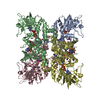
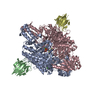
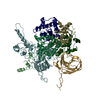
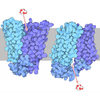

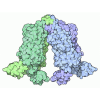
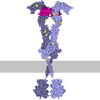
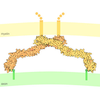

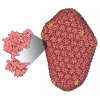

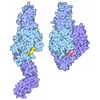
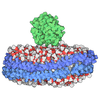

 Z (Sec.)
Z (Sec.) Y (Row.)
Y (Row.) X (Col.)
X (Col.)





















